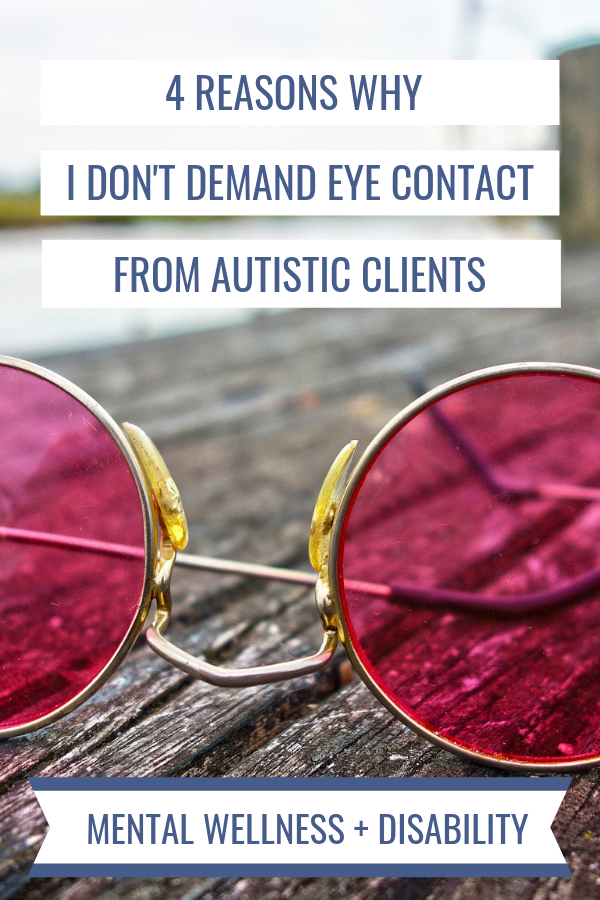Last week I was Janeen Herskovitz’s guest on the Autism Blueprint Podcast (listen here, Episode 45). I talked about how I practice mental health counseling with clients with Autism and other disabilities. Towards the end of the episode, I mentioned not caring whether my Autistic clients look me in the eyes during therapy.
Many therapists disagree with me on this. They offer behavioral therapies intended to increase eye contact from Autistic clients.
Some therapists get nervous when their views or methods don’t match what most people are doing. Luckily for me, I see 4 compelling reasons in my Code of Ethics that support my view.
I follow the American Counseling Association’s Code of Ethics. The Code’s Preamble outlines 6 values that provide the basis for the Code of Ethics.
Here are the 4 of them that justify why I don’t expect eye-contact from Autistic counseling clients.

Autonomy. Fostering the right to control the direction of one’s life.
Many parents have asked if I could coach their older teen or adult child to “do better” at eye contact. And despite the points I’ll outline in this post, I do understand why they’re asking. They’re afraid that their child will fail at school, at work, at relationships, and at life if they don’t fit in.
But my clients’ therapy is not about what their parents want for them, or even about what I want for them. It’s not what society expects from them.
Therapy is about my client’s goals for themselves.
My Autistic therapy clients do the hard work of showing up to counseling so that they can learn strategies to help themselves feel better when things get hard. They come to have a compassionate listener on their side. Sorting through all the pain that comes from living in a world where your differences aren’t understood, let alone appreciated, is a journey that many want support on. They want to overcome their anxiety and their loneliness.
They know that being able to look into someone’s eyes would not really scratch the surface of their struggles. It would be just another way to ‘fake it until you make it’…. except they don’t really want to make it. Not in that way. My Autistic clients want to be heard and understood. Accepted for who they are, not for how well they can pretend to be something else.
I’ve never had a client on the Spectrum who told me they’d like to improve their ability to look people in the eyes.
We do discuss how not giving eye contact affects them and makes them feel like an outsider. My clients have wanted to develop scripts to talk about their difficulty maintaining eye contact. They’ve asked for copings skills to manage the feelings of isolation and rejection when they see that others judge them wrongly for their inability to look them in the eye.
But no Autistic adult has ever asked me to help ‘cure’ them of this difference.
Nonmaleficence. Avoiding actions that cause harm.
I mentioned on the podcast that many of my clients describe sustaining eye-contact as painful. This can be especially true when they’re talking with new people. Or when the situation is ‘high pressure’, such as on their first days at a new job.
Many descriptions on the internet from Autistic people explain how unpleasant eye-contact feels. Here’s one that includes some particularly resonant descriptions. Researchers have just begun to recognize how widespread this complaint is. But they have not yet, at least from my reading, begun to examine what this widespread pain should mean for the future of research and therapies aimed at improving eye-contact.
The tragic thing is, I know that eye contact can be painful from talking with many Autistic people. These people:
- felt enough trust to share this with me AND
- had the communication skills to express their internal experience
There are thousands of people on the spectrum who are non-verbal. Many others can’t verbally articulate how eye-contact feels. Even if they try to express their discomfort through other behavior, they may not be understood.
Of course, it’s true that if you’ve met one Autistic person you’ve met one Autistic person. No two people fall in just the same place on the Spectrum. There are some Autistics who don’t feel discomfort when sustaining eye contact.
But, the large proportion of Autistic adults who do describe feeling this way is enough for me to say that there’s too great a risk. Getting an amount of eye-contact that I feel comfortable with is simply not worth causing anyone else physical pain.
Beneficence. Working for the good of the individual and society by promoting mental health and well-being.
I have never seen compelling research indicating that Autistic people who have been ‘trained’ at eye-contact experience increased mental health. I’ve never seen any study that looks to measure quality of life or mental health in relation to eye contact.
Many studies discuss the potential for eye contact to impact a person’s success at work or in relationships. But I have never found research that evaluates the relationship between eye-contact and these suggested outcomes.
As always, if you know of an article that I’ve missed, please do send it my way!
But, I have talked to dozens, maybe hundreds of Autistic people about eye-contact treatments. They’ve described feeling traumatized by therapies (and therapists) that made them look in someone’s eyes.
This is where the conversation becomes about more than one individual’s well-being.
Is it in society’s best interest to try to force Autistic people to fit in?
Even if it means causing them physical and emotional trauma?
Even if it means making them fearful of trusting mental health providers?
I don’t see how it could be. Doing so is rejecting neurodiversity. It’s suggesting that different isn’t just different, it’s wrong. This position implies that someone who is different should endure difficulty and physical pain to make those in the majority feel more comfortable.
I believe that it’s more helpful to an Autistic person to have tools to help them understand and explain their differences. Within these statements, the Autistic person can establish and communicate their boundaries. For many of my clients, it sounds like:
“I have a hard time looking people in the eyes. Please don’t ask me to hold eye-contact with you, because I won’t. Please do trust that if you’re speaking, I’m listening to what you’re saying. I am listening, even if it looks like I’m spacing out.”
Justice. Treating individuals equitably and fostering fairness and equality.
Here’s the thing about fairness and equality. Fair isn’t always equal, and equal isn’t always fair. That’s the basic principle behind accommodation.
My Autistic clients have some idiosyncratic ways that they take in information. Many of my clients like to look out the window during our sessions. Or they stare intently at a fidget they’re working with in their hands. But it’s clear from their responses to what I’m saying that they’re taking in every word. I understand that asking my client for eye contact may undermine his ability to listen. He may no longer be able to store the information he’s receiving auditorily.
Forcing an Autistic person to adjust and meet conventional social expectations may, in fact, interfere with their learning.
Is it fair to force someone to adjust how they receive information? Even at the expense of their ability to attend to or retain what they’ve learned?
To me, insisting on sameness smacks of inequality. It undermines the rich wealth of ways that our brains may best gather, interpret, and store new information.
Where you do you stand on the spectrum of agreeing or disagreeing with eye-contact therapy?
I recognize that I’m in the minority because of my views on eye-contact therapy.
Most researchers and other clinicians seem to believe that eye-contact therapy is a valuable use of time and money. They believe that it benefits Autistic clients.
As Janeen mentioned on the Autism Blueprint podcast: “So many parents and professionals are spending so much time trying to have [Autistic people] fit into the ‘normal’ box.”
I would love to hear your perspective on this! I welcome you to disagree with me, so long as you’re kind about it.












